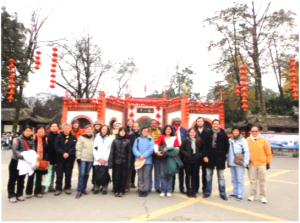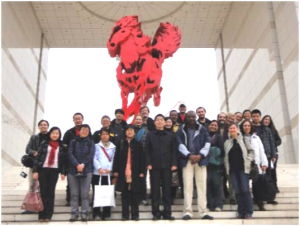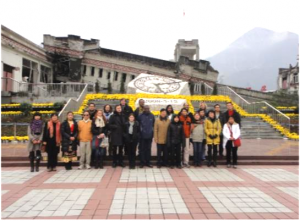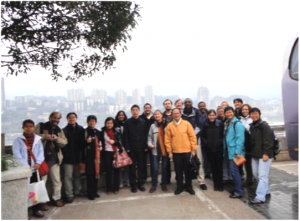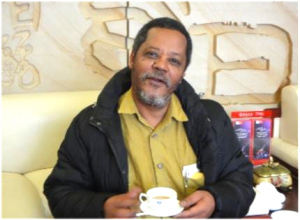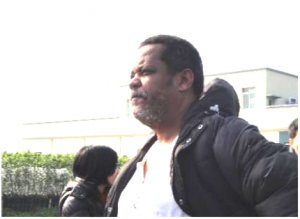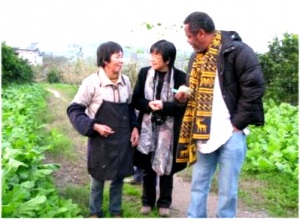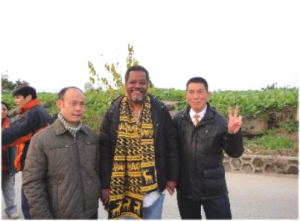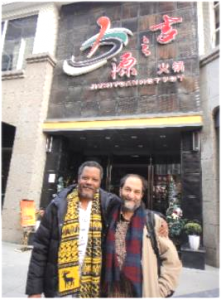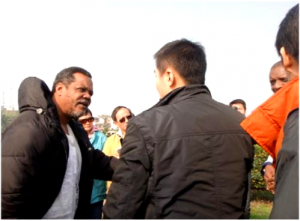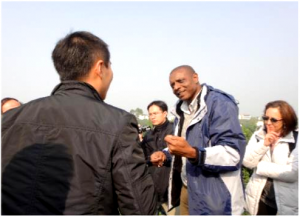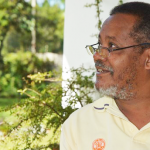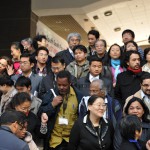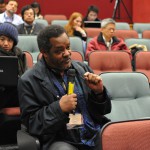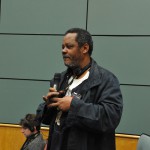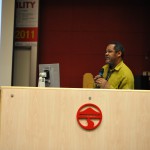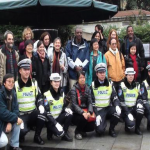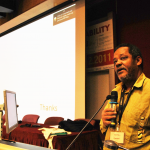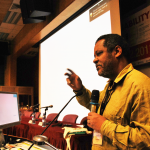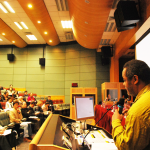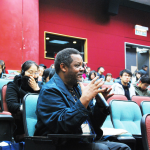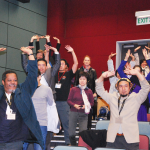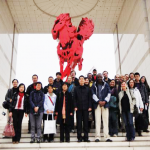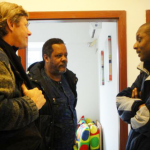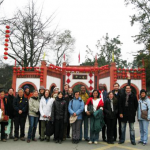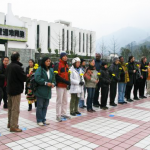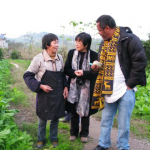->Link to the Page of Featured Author / Sam Moyo<-
Sam Moyo, former president of the Council for the Development of Social Science Research, was the leading Zimbabwean scholar of political economy, political ecology, rural social organisation, NGOs and rural politics. He published scores of articles, book chapters and the following books (as author, co-author or co-editor): The Land Question in Zimbabwe; The Land Acquisition Process in Zimbabwe 1997/8: Socio-Economic and Political Impacts; Land Reform Under Structural Adjustment in Zimbabwe: Land Use Change in the Mashonaland Provinces; The Land Questions, the State and Agrarian Transition: Contradictions of Neoliberal Reforms; Rural Electrification in Zimbabwe; Zimbabwe’s Environmental Dilemma: Balancing Resources Inequities; NGOs in Zimbabwe Developments; of the Crocodile: From Rio to Reality in the Developing World; NGOs, The State and Politics in Zimbabwe; Reform Baseline Survey in Zimbabwe: Trends and Tendencies, 2005/06; The Case for Sustainable Development in Zimbabwe: Conceptual Problems, Conflicts and Contradictions; The Southern African Environment: Profiles of SADC Countries; Energy Policy and Planning in Southern Africa; Environmental Security in Southern Africa; Peasant Organisations and Democratisation in Africa; Reclaiming the Land: The Resurgence of Rural Movements in Africa, Asia and Latin America; Land and Sustainable Development in Africa; Recuperando La Tierra: El resurgimiento de movimientos rurales en A`frica, Asia y Ame`rica Latina; Contested Terrain: Land Reform and Civil Society in Contemporary Zimbabwe; Reclaiming the Nation: The Return of the National Question in Africa, Asia and Latin; CODESRIA Multi-National Working Group Book on Land Question; Land and Agrarian Reform in Zimbabwe: Beyond White-Settler Capitalism.
In memory of Sam Moyo (1954-2015)
Patrick Bond
23 November 2015
“We just received this evening the sad news of the passing away of Professor Sam Moyo, former President of CODESRIA. Sam was in India for a conference and got caught up in a bad car accident and got seriously injured. We’ve been getting regular updates about his condition all day from our colleagues in Delhi. Unfortunately he didn’t survive the serious injuries he sustained. May his soul rest in peace.”
Sam was from a peasant background and rose to become one of Zimbabwe’s – and Africa’s – most respected intellectuals. You will all remember him from Hong Kong and Chongqing/Chengdu:
Chongqing Chengdu video in commemoration of Vinod:
http://www.youtube.com/watch?v=zJoDhMGTtkA&feature=youtu.be
At 10:30 in this wonderful video tribute to Vinod, you find Sam, briefly expressing gratitude for the experience. The skillful film-maker found him in several other places which bring back such warm memories.
At our Centre for Civil Society here in Durban, Sam played such a wonderful role, especially since he started visiting in 2012 and co-supervising our PhD students in 2014. He was one of our Honorary Professors, and there is some information about his career here: http://ccs.ukzn.ac.za/default.asp?10,86,8,164
It was the trip to Chongqing that allowed us to arrange that position, one of many many reasons I always look back four years, with such admiration for our hosts.
I was last with Sam in Harare in August, at an excellent talk he gave about Zimbabwe’s agricultural sector: https://www.youtube.com/watch?v=q-Y6iBl3BOE and this is a great explanation of his theory of the tri-modal land structure in Africa: https://www.youtube.com/watch?v=p5–ZntJGh4
In June, he was awarded for his enormous contributions to Marxian political economy at the World Association for Political Economy conference in Johannesburg; he was also made a vice-chairperson of that organisation.
For those interested, see attached for a list of GoogleScholar citations of his most popular works and more YouTube links. Below is the beginning of what I think is the last article he published, and his last interview. If you would like more of his published work, at least some of his articles and a book that I can send as files, just let me know.
This is all very rough, just a chance to say that we are losing an exceptionally important intellectual and comrade this weekend, and we owe it to ourselves and our tradition – and to all who struggle to fuse knowledge and social progress, wherever we may be – to keep reminding ourselves of Sam’s legacy. And his generosity of spirit. We will be posting further memorial statements about his work and remarkable life at http://ccs.ukzn.ac.za this week
Sam’s Acceptance Speech he gave when he was elected President of CODESRIA in Younde in December 2008
Tributes to Sam Moyo
WEN Tiejun
The first heavy snow in the winter of Beijing,
With the heartbreaking chill,
Came the message of the sudden death of my old friend, Sam Moyo.
He seemed to be quietly leaving amidst the fleeting snowflakes…
The first heavy snow in the winter of Beijing,
With the heartbreaking chill,
Beijing, Chongqing, Hong Kong — his traces were everywhere,
Conference halls, villages, classrooms — his voices echoed around,
In my mind, I see his image active in different parts of China,
In my heart, I cherish his warm smiles and sharp views.
Sam Moyo has departed. Yet, he is still among us.
Lau Kin Chi
In memory of Sam Moyo
30 Nov 2015
I try hard to look back, to remember the first time Sam Moyo and I met. And I cannot remember. For me, it had long been taken for granted that Sam and I would meet, now and then, in some major international encounters. I look at my photo albums for the traces of Sam. Yes, we were together at the International Conference of Intellectuals and Artists for the Defence of Humanity and the General Assembly of the World Forum for Alternatives (WFA), held in October 2008 in Caracas, Venezuela.
One highlight of the conference was President Hugo Chavez spending several hours with the participants for a lovely intellectual exchange, and surely, Chavez talked most of the time, and the conference ended near midnight, most people going hungry without dinner.
In some sessions on that occasion, I sat between Sam and Vinod Raina. We must have known each other quite well already. Still, I cannot remember when we first met. Probably in one of the encounters organized by the WFA, with Samir Amin, Francois Houtart, Remy Herrera, and others. We might have met too in Porto Alegre, Durban, Dakar, Mali, Nairobi, Algiers, Tunis, Mumbai … Sam’s image, for me, is twinned with that of Ebrima Sall. Which is why I was slightly disappointed when Ebrima came to the Bandung+60 Conference held in Jakarta and Bandung at the end of October this year, but Sam did not come. To me, the two were like brothers. They both attended the First South South Forum on Sustainability held at Lingnan University in Hong Kong in December 2011, and they both joined the post-forum tour to Chongqing on December 16-21. Those were memorable times. Tour group members included Sam, Ebrima, Vinod, Patrick Bond, Mayu Santana, Tani Barlow, Ariel Salleh, Srecko Horvat, Surichai and Chantana Wungaeo, Ernesto Revello, and others.
My 14-year old niece was tasked to produce a video documentary of the trip. (See https://www.youtube.com/watch?v=zJoDhMGTtkA&feature=youtu.be) During the 6-day trip when we visited the city and countryside of Chongqing and Chengdu, and talked to peasants, migrants, earthquake victims, cooperative members, social workers, officials and others, we also had good opportunities for chatting among ourselves about politics, economics, culture, and any issue, significant or trivial.
Before the Chongqing trip, with the question of agro-fuel aggravating the issue of land-grab in Africa, I had discussed with Sam the idea of collaborating on a project on the question of land and land-grab in Africa, and tracing China’s involvement. I wanted to have some sense of the land situation in Africa, with European powers dominating the scene but with “emerging” forces such as Japan, South Korea and China entering as contesters. Would it be possible to map the temporal and spatial land grab, as well as to revisit the question of land reform in Africa and Asia? After some thought, Sam felt it was very difficult to obtain accurate data, as shareholding and business contracts were by and large secretive and camouflaged. We did not pursue this further.
Instead, we had ideas about revisiting issues of land reform and exploring alternatives for rural reconstruction movements in Africa and Asia. Sam started being Chief Editor of Agrarian South in 2012. In the book project on The Struggle for Food Sovereignty – Alternative Development and the Renewal of Peasant Societies Today, of which Remy and I were co-editors, Sam was a participant, along with Samir Amin, Joao Pedro Stedile from Brazil, Utsa Patnaik from India, Wen Tiejun, Erebus Wong and Jade Sit from China, Gerald Choplin et al from Europe, and Poeura Tetoe from Tahiti. Putting together papers with perspectives from different continents was meant to enable us to grasp the global and local dimensions of the urgent issues facing us today.
This intellectual project does not end with the publication of the book by Pluto Press this year, for so many issues demand rigorous follow up. That is also the reason for the setting up of the Global University for Sustainability (Global U). (see www.our-global-u.org) Sam was among the first persons to become Founding Members of Global U. The idea of Global U is to strengthen exchanges especially in the global south, and support the proliferation of autonomous and self-managing local bodies and their interdependent networking for ecological justice and socioeconomic justice. Global U has embarked on a project of documenting the life history of activist thinkers from across the globe, relating their personal stories to historical conjunctures, offering an understanding of their thought based on activist practice. The project has speeded up after Vinod left us in September 2013. I regret I did not attend the CODESRIA Assembly last June, or I would have interviewed Sam and learnt about his life trajectory, his happy and sad moments, his aspirations and frustrations. I hope Sam’s story would be narrated by his family and comrades. It is extremely difficult to come to terms with the thought of Sam leaving us at his intellectual prime. He will be remembered for his honesty and integrity, his wit and wisdom, his internationalist horizon, and his commitment to make a better world. Deep condolences to Sam’s family, friends, and the CODESRIA, WFA, and Agrarian South communities.
Amina Mama
Goodbye Sam: brother, comrade, fighter and friend
Kotoka International Airport , Accra, was the last place I ran into Sam, seated in the departure lounge after a workshop on the land questions that he devoted his intellectual life to. We shared a beer, talked with intimacy about his life and mine, how both are inflected with the disparate ancestral and present-day contradictions that typify our generation, and discussed how these might inform both intellectual endeavours and activism. On this occasion, Sam reflected on the early days he spent in Calabar, Nigeria, and how the very different organization of land that he found In West Africa transformed his hitherto Southern African thinking. We reminisced too, recalling earlier visions of what the African scholarly community could become. A favourite we shared is the often-discussed dream of an ‘African Bellagio’ (which we would name differently, of course), possibly on the shores of Lake Malawi, where African scholars and researchers could overcome the vagaries of our variously precarious conditions, coming together to concentrate our best energies and skills, to re-inspire and re-connect, and to pursue the redistributive transformations that lie ahead, that we know must happen.
A complex personal history may go some way to explaining Sam’s remarkable, incisive and visionary intellect, and the manner in which this was coupled with all-embracing generosity of spirit. The rigorous scholarly work he carried out in collaboration with so many was driven by Sam’s deep commitment to serving, and facilitating the liberation of oppressed and marginalized peoples, across the South. His roots in rural Zimbabwe as well as in urban township communities lent him profound insight into the land-questions that continue to stall justice and democratization, but which -properly addressed – would end poverty and inequality in Zimbabwe, the rest of Africa, and across the former colonies of the South. His multiple racial and cultural identifications made him a voracious traveller who was able to engage deeply with people across ideological, cultural, national and disciplinary borders, to vigorously debate ideas wherever he went, inspiring and mobilizing across generations.
Few , if any, of us could pass through Harare without being invited home, to ‘gist,’ to drink and eat the pots of food he would produce with abandon. Sam stirred many things beyond belly-filling food. Chez Sam, we ate well, but most of all we feasted on the intense intellectual and political debates he also liked to stir up, stretching our minds as well as our bellies. Few of us will forget the winning embrace of his smile or the warmth of his big brotherly hugs – these earned him the affection that girded the respect colleagues, friends and community felt for him.
The African Institute for Agrarian Studies, established in 2002 was the pioneering initiative that Sam dedicated himself to for the last thirteen years of his energetic career, a remarkable endeavour that grew to span three continents, bringing together people-focused land expertise from African, Latin America and Asia. His death in India, tragic and shocking as it is for us all, occurred when he was doing what he was most committed to, what he most loved. Colleagues and fellow travellers, we owe it to Sam to continue to pursue his vision, and to collectivise the mission he discovered in the course of his brutally foreshortened life, for posterity, for the liberation of the still dispossessed.
Sam was no angel, as the women he has loved in the course of six decades of a life fully lived can surely testify. At the same time, his unadulterated joie de vivre was one of his most endearing features – even as we worried about his health at times! We need not have. Death was to take him away from us ahead of his old age, and at the prime of his activist-intellectual life. This tragic end also snatched Sam away from a new chapter in his personal life, with his equally courageous fighter for human rights, Beatrice Mtetwa. Beatrice, my heart goes out to you – your pain must be unimaginable, inconsolable. Know that you have the love and support of us all, and a life to live, people to serve.
Sam will surely live on in our hearts, our ideas, in our actions, and in our vision of a liberated and just Africa.
Goodbye Beloved Comrade.
Amina Mama
Arindam Banerjee:
This is an irreparable loss of an exceptionally inspiring intellectual. May Sam rest in peace and his legacy continue to inspire us.
Sam Moyo: A Scholar for the Oppressed (1954-2015)
The tragic and untimely departure of Sam Moyo from amidst us creates a void that can be filled only through an uncompromising commitment towards the poor and an unflinching solidarity with struggles of historically oppressed people. Passionate as he was about correcting the past injustices faced by the ‘South’ through long and variegated histories of imperialism, Sam made his arguments based on crisp logic and hard evidence. Till his last day, he was an inspiring and untiring soldier against injustices and inequality, both historical and of contemporary origin.
The enormous span of Sam’s scholarship covering issues like the land question, agrarian development, food sovereignty and rural development, to name a few, comes across as an integrated and comprehensive critique of imperialism, in its evolving forms, including neo-liberalism as the recent most form. The deep engagement with the exploitative processes of imperialism, often transgressing the boundaries of traditional disciplines in his treatment of the subject, has been an inseparable part of Sam’s academic writings. He has also been truly exceptional in recognizing the necessity of creating indigenous knowledge and understanding from the ‘South’ and devoting his energies to building solidarity between scholars and activists from various ex-colonies.
Through his numerous papers, monographs and books, Sam Moyo has developed and presented a colossal understanding of the land question in his own country, Zimbabwe, and in the larger landscape of Southern Africa. As part of the Lancaster House Agreement which assisted Zimbabwe’s transition to independence, the land question was attempted to be addressed within the neo-classical, market-based ‘willing buyer-willing seller model’, focussing on questions of efficiency and bereft of any recognition of past land alienation faced by the “natives”. In contrast, Sam’s analysis of the land question was always anchored on the long, historical land expropriation from the native black population, through territorial and legal segregation policies, under white-settler colonialism in Zimbabwe, like in other parts of Southern Africa.
He pointed out that such sustained land expropriations meant that at the time of Zimbabwean independence in 1980, 6000 farmers from the white, agrarian bourgeoisie controlled 15.5 million hectares or nearly 50 per cent of agricultural land in the country, while one million black households were confined to the rest of the land. The typical mode of production that such settler-colonialism produced made possible the super-exploitation of a land-short, semi-proletarian black labour, whether in the settler-farms or in the mines, heavily inter-twined with race, gender and ethnic relations. In Sam’s own words:
‘…white-settler capitalism, organised the labour process such that white capital exercised both ‘direct’ and ‘indirect’ power over the indigenous black population…The labour process in colonial Zimbabwe came to be characterised by an enduring contradiction between proletarianisation and a politically-engineered functional dualism, by which petty-commodity production in the communal areas, and especially unwaged female labour, would subsidise the social reproduction of male labour-power on mines and farms. This contradiction would produce neither a settled industrial proletariat nor a viable peasantry, but a workforce in motion, straddling communal lands, white farms, mines, and industrial workplaces. (‘The Land and Agrarian Question in Zimbabwe’, Sam Moyo, 2004)[1]Armed with a Marxian Political Economy framework and a careful analysis of history, Sam was at a distinct advantage to give superior insights when the radicalization of the land reforms agenda in Zimbabwe occurred in the late nineties leading to the introduction of the Fast Track land Reforms Programme (FTLRP) in 2000. As the head of the Land Reform Technical Advisory Team of the Government of Zimbabwe, he remained a close observer of the FTLRP.
Amidst the political furore over FTLRP, mainly from the ‘North’, which also led to an economic isolation of Zimbabwe, a considerable academic literature (mostly from the North) put forward the argument that the Zimbabwean land reforms was nothing but ‘land grabbing’ by the black elites and the ruling ZANU-PF cronies; and that such cronyism led to a culture of violence, chaos and disorder, and destroyed the productivity of Zimbabwean agriculture leading to a food crisis.
Questioning this narrative, Sam pointed out the dangers of dubbing the FTLRP as mere ‘land grabbing’ by the local elites. In an international context, from the nineties, one witnessed a renewed scramble for land in Africa (and other parts of the developing world) by international agri-business capital in the name of raising agricultural productivity and producing ‘clean’ agro-fuels. Under the pressure of neo-liberalism, most African governments reformed their National Land Policies to allow privatisation and the appropriation of extensive land tracts by foreign capital. According to him, to equate the Zimbabwean FTLRP to a similar ‘chaotic land grab’ was to obfuscate the critique of neo-liberalism and to ignore the question of agency. With exceptional clarity about the politics of this discourse, he wrote in 2011:
‘The language of ‘land grabbing’ creates a moral and political equivalence between the restitutive appropriation of colonially dispossessed lands for state-led land redistribution and the recent externally inspired land grabs in Africa, despite the latter’s neoliberal roots. Preoccupation with a ‘chaos’ perspective conceals the structure and agency that evolved during the FTLRP…’ (‘Land Concentration and Accumulation after Redistributive Reform in Post-Settler Zimbabwe, Sam Moyo, Review of African Political Economy, 2011)
Backed by extensive field-work, Sam argued that though a few black elites captured land with the help of government agents, the majority (70 per cent) of 1,65,000 beneficiary households were settled in the small-scale farming sector, with new access to pieces of farmland crucial for their survival. In fact, he underscores that in terms of scale, agency and discourse, the FTLRP was a radical land reform, benefitting people who have been historically evicted from land; and this redistributive reform stood directly pitted against the contemporary and hegemonic neo-liberal logic of capitalist accumulation by dispossession for purposes of export-oriented large-scale food and agro-fuel production.
Despite his strong defence of the FTLRP at a time when his country and government was internationally isolated, it would still be difficult for those who disagreed with Sam to place him in the camp of the Zimbabwean ruling establishment. Even as he reiterated the radical nature of the Zimbabwean land reforms, in the same breath, he criticized his government for making neo-liberal concessions due to pressure from the ‘West’. In a cautionary spirit, he drew attention to the fact that the radical land struggle had still not led to the social democracy that it promised. He observed that most of the farm workers did not benefit from the FTLRP and practices of ‘compound farm labour tenancy’ and low wages continued to reproduce cheap labour as in the past, even when the land monopoly had been broken. Sam’s discourse never abandoned the exploited.
In more recent years, Sam had devoted his scholarship to bringing back the ‘national question’ within the development discourse. Along with his comrades and colleagues from the South, Praveen Jha and Paris Yeros, he explains how the ‘emancipation of peasantries’ from colonial oppression was a central question of the national liberation struggles of colonies and why the peasant question continues to remain relevant under neo-liberal globalization. He saw the latter as a process of re-colonization of the Third World peasantries and natural resources, and peasant resistance to these neo-liberal processes as the ‘primary component’ of the agrarian question in the South presently.
Inspired by the views of Franz Fanon and Amilcar Cabral, Sam argued that the peasantry in colonies emerged as a truly revolutionary force under colonialism, channelizing their energies towards the national liberation struggles, and that the latter was a ‘process of self-becoming of a people denied of history by colonial rule and racial doctrine’ (quoted from ‘The Classical Agrarian Question: Myth, Reality and Relevance Today, Sam Moyo et.al., Agrarian South: Journal of Political Economy, 2013). According to him, under contemporary globalization, the new agrarian question is defined by the resistance that the peasantry builds up, in defence of its gains from national liberation, against the neo-colonial systems of domination that have emerged under the aegis of international finance capital.
For Sam, neither the peasantry is ‘dead’, nor is the agrarian question irrelevant. Rather the peasantry was the ‘wretched of the earth’ (to use the term he borrowed from Fanon) carrying all the hopes of resistance to injustice and progressive transformations, both in the colonial period and under imperialist globalization currently.
Along with his comrades, Sam tirelessly gave leadership to the project of developing the conception of the agrarian question from the ‘South’, including the publishing of the Agrarian South: Journal of Political Economy. He was, however, not satisfied merely by making his own point convincingly but placed equal importance in creating future generations of scholars who would engage with the peasant question and imperialism. As head of the African Institute of Agrarian Studies (AIAS), he ensured that scores of young scholars from various countries of the South would interact with each other in the annual training workshops in Harare.
On the few occasions that I had the privilege of interacting with him, I always found him inspiring in his own warm and exceptional way. Of these interactions, two need mention. Once when I met him at the South-South Forum for Sustainability, at Lingnan University, Hong Kong, upon knowing that I teach a course on colonialism, he inquired whether I have included African colonial history in the syllabus. Later in the evening, when the sessions were over, he caught hold of me in the corridor and over tea, started a conversation on the colonial past of Africa. By the end of the fairly long conversation, I found myself greatly enriched in my knowledge. I also realized that bringing Africa into the discourse on colonialism, no matter in which corner of the world such a discourse may be developing, was extremely important for Sam!
On the other occasion, when he visited the Ambedkar University in Delhi for a lecture to research students and faculty members on agrarian development, he asked the organizers (who were a bit intrigued by the request) to project a map of Africa on the screens. Using the map, he spoke to the audience for more than an hour, delineating the geography and history of agrarian relations in colonial Africa. During Sam’s lecture, the map came to life as he traversed through the various facets of colonial history and the struggles of the African peasantry. Truly, Africa, its people and the history of their subjugation cannot be comprehended without recognizing the contributions of Sam Moyo. Needless to say, struggles to change that history of exploitation, not only in Africa but in the larger developing world, for a better future where the oppressed are emancipated, will be the noblest tribute to his memory.
BE Nzimande
MP, South African Minister of Higher Education and Training
In Memory of Prof Sam Moyo. Message from Dr BE Nzimande, MP, South African Minister of Higher Education and Training
I would like to express my deepest condolences to the family, friends and colleagues of Professor Samson Moyo. His untimely passing was a great shock to me and to other South Africans who knew him. I feel his loss very deeply as he was a friend as well as a collaborator in various projects. He was wrenched from us at the height of his powers as a leading African intellectual, an activist and an institution builder.
I knew Sam for many years – from the time of our liberation struggle against apartheid in the mid 1980s. I met him through the SAPES network led by Dr Ibbo Mandaza. He had fought for the liberation of Zimbabwe and he was committed to the cause of a free, democratic, independent and prosperous African continent. His dedication continued throughout his life.
This is demonstrated by all his work and more especially his intellectual work for the benefit of our continent. Sam was held in high esteem by the intellectual community in Africa and beyond. He served for many years in CODESRIA, the Council for the Development of Social Research in Africa, successively as a Member of the Executive Committee, Vice President, and finally, from 2009 to 2011 as President
Sam’s specific areas of interest was agrarian studies, in particular policy regarding agriculture, food, land reform and the environment. After working in these fields as a professor at the University of Zimbabwe and as a government advisor, he demonstrated his social entrepreneurship and institution-building skills when by established the African Institute of Agrarian Studies.Sam was a true internationalist. His very passing in India, on a work assignment far away from his home, is testament to his internationalism and his understanding that the challenges that face humanity are universal. His internationalism is also demonstrated by his contributions in South Africa. Several years ago, I decided to establish a National Institute for Humanities and Social Sciences and asked him to assist us and to bring with him his experiences and deep knowledge of social science research across the continent. He accepted my request without hesitation and when the Institute was formally established two years ago, Sam became a valued, useful and influential member of its Board.
Despite all his accomplishments, Sam remained modest and unassuming. He was a kind and gentle person and had an easy way with people. He was the type of individual that you one quickly felt at ease with.
My grief at his loss is shared by the South African government and all South Africans who knew Sam Moyo. Our grief is profound and sincere; we will do all we can to ensure that the path that he trod will be followed by others and especially by younger academics and the youth.
Hamba kahle, Sam, brother and friend..
Bella Matambanadzo
An Ode in Memory of Chimusoro Sam Moyo
An unimaginable loss has happened. Our phenomenal intellectual pan African giant on land issues, Professor Sam Moyo, has died following injuries sustained during a terrible car accident in New Delhi, India. We are in disbelief. We are waiting for him to come home. We feel ripped apart with pain.
We grew up following you in our townships. We nicknamed you Sekuru ’Chimusoro’, the one with the very big head. All our parents wanted us to be exactly like you. At the end of every school term, you would come home with a report card full of number ones. Your arms would be laden with trophies and certificates for best student in this subject; outstanding record in that.
Your mother, Gogo Mavis Moyo’s face would beam with enough joy to light up the whole continent. She was a woman of her own accolades, a pioneer black female broadcaster at a time when radio was segregated by racism. But somehow your achievements made her glow in the way that only a mother can do.
We always marveled at the shiny silver cups with your name on them. Playfully, you would fill them with cherry plum juice and serve us to drink along with candy cakes. The pink icing would crease between our fingers. Domestic chores, serving those around you, never bothered you. You had such a deep sense of the hospitality of food, and the power of sharing drinks with those you loved, that we always felt welcome to your side. Our great tree that bore so much fruit. Yes we would laugh, but you would steer us to talk about the thing that mattered most to you; and even if we did not know it then, to us. How to fully reclaim the land that was stolen by the colonial forces.
Throughout your life, you carried your intellectual smarts with so much ease. In your later years, when your trophies had turned to degrees, you would seek us out so we could sit in your seminars. At that time I think you were at the Zimbabwe Institute of Development Studies (ZIDS). Later on you moved to SAPES and taught the SARIPS Masters Programme with radical feminists like Dr Patricia Macfadden you made our brains sweat. In the beginning we would all look at each other unable to write down some of the big words and theories you used. And yet you persisted. Sharing your knowledge with us, crafting an epistemology around land and agrarian rights. Together you showed us why land was a critical resource for women to have ownership and control over.
When we tried to call you Prof, you would smile and say, ’vafana vangu, ndinonzi Sam – my youngsters, I am just Sam.’ It didn’t matter that you had ’eaten many books’ as the saying used to go. You would listen to our elementary theories, nurture us with love and suggest, ’let’s write a policy brief on this subject. That’s how we will change the world’.
You lent your brilliance to the environmental think tank Zero, pulled us into the Senegal based Codesria and introduced us to people who wore Dashiki shirts as a form of political expression. People whose papers you had photocopied for us to read. This was before computers. It was the time of type-writers. Your scrawl was impossible to decipher, but we knew that if we didn’t figure out your handwriting, there would be trouble. You could not abide intellectual laziness.
On Boodle Road, in Harare’s Eastlea suburb you set up the African Institute of Agrarian Studies (AIAS). It was nothing short of a bold move. This was Zimbabwe in the early 2000s when land invasions were at their apex. Nothing could deter you. Not physical threats, nor slurs to your name. And who can forget the raid of your home office in Borrowdale. You put your ubiquitous cigarette to your mouth and shock your head. ’ why did they have to mess my papers up? I had order here’. I would look at the piles and piles of papers you had and wonder what kind of order you meant. Your office was a project for a neat freak.
Last year, we danced until dawn in your front garden. Your lawn groaned underfoot of our stampede. It was your 60th birthday party. Food, music, friends and land politics. The delicious chocolate cake was a creative meme of your desk. Cellphone, books on land with the spine carrying your name. And of course your friends from all over the world filled your yard. Or skype feed.
By your side was your sweetheart and partner, the top human rights lawyer Beatrice Mtetwa. We marveled at how possible it was for two wonderful, strong and brilliant human beings to love each other so much. It made us feel good to see you dancing. It was as if no one else was around as you smiled at each other and twirled each other to Hugh Masekela’s trumpet. Power couples that publicly show each other affection and validation are so very rare in our activist civil society worlds. We were hoping for a huge international African wedding and had decided we were going to be in the bridal party. I don’t know how we will comfort you Beatrice. I don’t know how we will comfort Gogo Moyo. What will we do for Sibongile and her sisters?
On the days I forgot to call to check on you, you would ring. And demand our company. ’Is Nancy (Kachingwe) around? Where is Saru? Let me make you Oxtail. Bring your friends over’. You always offered your home to us, wether you were there or not.
Thank you for giving us so much of you Sekuru Chimusoro. Siyabonga Moyondizvo. We will forever carry you in our hearts. Broken as they are by your untimely and devastatingly painful death. Alone, so far away from the homeland you fought so hard for.
Darwis Khudori:
Personally, I met him for the first and the last time in WSF Dakar in 2011 although I knew him through his works before and after the meeting. The message from Jayati added a meaning of his personality in people’s movements in the Global South. Let us enhance his works in our Bandung Spirit-based movements.
Dzodzi Tsikata
Associate Professor Institute of Statistical, Social and Economic Research (ISSER), University of Ghana Legon, Ghana
Today was an incredible day. Zimbabweans came to mourn a beloved son, and were impressed by all the outpourings from around the world. Praveen Jha’s tribute had a beautiful Pablo Neruda poem in his tribute which was read as the burial service as was Shivji’s poem to Sam. Also read was Madam Zuma’s letter. Mourners came from far and near and included members of government in Zimbabwe and South Africa. The academics present were asked to be pallbearers, so we all went and carried Sam’s coffin to the hearse. There was a lot of high emotion at different points., but the most difficult was when Quondisile spoke so movingly about her father’s love for his daughters.The music was sublime and very comforting.
After the service, we drove to Glen forest, a new private cemetary to bury Sam. Those who wanted to invited to put a single white rose in the grave.
We then went back to the house for lunch and then we left after 2pm. There was a CODESRIA delegation of eight- myself, the current Executive Secretary, two former executive secretaries, one executive committee member and one former executive committee member, one staff member and a former staff member.
Now we have laid Sam to rest, may the healing process begin and may we begin to work in different ways to be true to his legacy.
Enna Sukutai Gudhlanga
Sam Moyo by Enna Sukutai Gudhlanga (Zimbabwe)
Am deeply saddened by Prof Sam Moyo’s passing on in India where he was attending a conference on the Labour Question in the Global South. The academic fraternity has really been robbed of a giant who was eager to mentor both seasoned and upcoming scholars. We have been deprived of an erudite scholar and a fine gentleman. I will never forget the assistance he gave to our CODESRIA CRN Team, the project culminated in a book which was published in 2015 by CODESRIA titled: Gender, Politics and Land Use in Zimbabwe, 1980-2012. The Land and Agrarian Studies question will never be the same without Prof Sam Moyo. We have been privileged to know and learn from the prolific Professor par excellence of our time. Fare thee well Prof Sam Moyo, may your soul rest in eternal peace. May your family, the AIAS FAMILY, the CODESRIA family and the whole academic fraternity be comforted.
Fatima Harrak
A Tribute to our Colleague and Friend Sam Moyo
It was such a shock to hear about Sam’s passing.
Sam was a brother, a friend, a scholar, a dedicated pan-Africanist and a person who infected everyone with his great spirit.
From our first meeting in Yaounde, Cameroun, where he was elected as President of CODESRIA to working by his side as his deputy during three years Sam Moyo always had about him a passionate dignity that made him an inspiring leader and a great human being to be around. Energy, commitment, integrity are all words that captured the moral fiber of this man.
In addition to his renowned scholarly contribution to the study of peasant social movements, agrarian reform and land struggle in Africa and his exceptional leadership abilities. Sam was also a caring, generous and selfless person who loved life and believed in the goodness of people. I experienced his kindness as I succeeded him at the head of CODESRIA when he offered his unconditional support and advice.
Sam was one of a kind and will be sorely missed as a colleague, scholar and friend but never will he be forgotten by those who were fortunate enough to have known him!
Firoze Manji
Mahmood Mamdani
A Tribute to Sam Moyo By Mahmood Mamdani
I no longer recall when exactly I met Sam. Maybe it was in the late 70s at CODESRIA, or in the early 80s at the Zimbabwe Institute of Development Studies. The late 1990s, though, was the time we truly got to work together, closely and intensely. The two of us were at the helm of CODESRIA’s leadership, as President and Vice President. The next two years were a time of deep and sharp differences in policy, and it often seemed as if there was no end in sight.
I remember a particularly difficult episode a year down the line. We had an emergency meeting in Dakar but Sam said he could not be there because he was to have a delicate operation in a few days. I explained what was at stake and asked if he could postpone the operation by a week. He warned me that he would not be able to sit for long in his current state. But the next day, he was in Dakar. During the meeting, he kept on shifting the weight of his body from one side to the other, now leaning on one buttock, then on another. He was obviously in great pain, but it never showed on his smiling face.
That was Sam, selfless, committed to a fault, totally reliable. He was the person you would want by your side if you expected hard times ahead. But no matter how difficult the times, as during those years, I never saw him turn vindictive against anyone. Later, we would look back on that period as something of a crossroads in the history of CODESRIA. Then, however, it was hard and painful. It was the kind of ordeal that can forge enduring friendships. Sam was that kind of a friend.
In those years, I also learnt that Sam was a mathematical genius. As soon as we would land in Dakar, he would head for the Accounts office, take charge of all the books, and go through them meticulously. No matter how long it took, 12 or 24 hours, Sam would work until he would have a report ready for discussion between the two of us. Soon, word went around that it would be foolhardy for anyone to try and pull a fast one on Sam.
Students and scholars came to CODESRIA for different reasons, some for the thrill of travel, others to be part of a Pan-African conversation on issues of the day, and yet others to access otherwise scarce resources for research. Sam shared all those motives but, above all, he was among the few who unfailingly gave more than he received. When it came to facing temptation or intimidation, his was a towering presence. Sam stood for integrity and steadfastness, a calm intelligence and a cool deliberation, a level head in a crisis situation, and a free spirit in a party that was sure to follow every difficult episode.
Sam was one of the few who presented a seamless blend of this capacity for sobriety, integrity and joy that marked the CODESRIA crowd – all with a cigarette in one hand no matter the time of day, and a glass of beer at the end of the day. The ground on which this companionship was nurtured was the city of Dakar. We came to it from different corners of the continent, all marginal in one way or another, all looking for freedom, most of all the freedom of expression, as if gasping for oxygen. Out of that common endeavor were born close associations and lasting comradries.
Sam’s major scholarship was in the field of agrarian studies. Always unassuming, he seldom talked of his own scholarly work unless someone raised it first. For me that occasion came in 2008 when the London Review of Books invited me to write a piece on Zimbabwe. The land reform was the big issue at the time. I pulled together whatever studies on the subject I could lay my hands on. Three sources stood above all others as original and reliable: one from the Institute of Development Studies at Sussex, another from the University of Western Cape and then Sam’s work at the African Institute of Agrarian Studies in Harare. As I read these sources, and the press reports on their findings, I learnt something about the politics of knowledge production and its recognition in the public sphere. Two facts were crystal clear to me: one, that Sam had been several steps ahead of the others; and, two, that his work was the last to be recognized. It was almost as if the press went by a rule of thumb: when it came to ideas, the chain had to originate in a Western University, and the link go through a South African institution, before it came to an African researcher.
I discussed this with Sam. He smiled, as if to say, what’s new? At home, his critics were at pains to paint him as partisan. If he showed that the land reform had improved the lot of a large number of the landless, those in the opposition discounted it as the claim of someone with the regime. But if he refused to give blanket support to the regime, those with it said he must have hidden links to the opposition. When it came to public policy, Sam took the cue from his research, always fearless, unafraid, and hopeful. He was a voice listened to by all, especially when he was the target of criticism. Whatever their disagreement, all knew that Sam was not susceptible to corruption, and that he would not offer an opinion unless it was informed by deep research.
The last time I saw Sam was at the CODESRIA General Assembly in Dakar in June. Only two months before, we had been together in the city of Hangzhou in China at a conference organized by the Inter-Asia School to celebrate the 60th anniversary of Bandung. The hospitality was overwhelming. Every meal was like a banquet; every plate on the table was renewed before it could be empty; wine and drinks flowed. Sam was relaxed, as he reminisced of our efforts to build CODESRIA over the past decades, and reflected about future plans for the African Institute of Agrarian Studies. I recall this as if it was yesterday: Sam, smiling, trusting, reassuring, strong, purposeful, and thoughtful, yet again doing what he was best at, charting a road none had travelled before, but at the same time taking you along.
This is one journey, dear Sam, that you take alone. You leave this world as you came into it, alone, but this world is a better place, and we are better off, because we had the privilege of being part of your world. The loss is great and the heart is heavy, and it is hard and painful to say good-bye. As we grieve for our loss, we also celebrate your life.
IDEAs Team:
In deep sorrow we mourn the sudden and untimely death of Sam Moyo, profound scholar and progressive activist, beloved comrade, Member of the Executive Committee of IDEAs. Sam was in New Delhi, India to participate in a conference on “Labour Questions in the Global South” when a car he was travelling in was involved in a terrible accident. Two other friends and colleagues (Marcelo Rosa and Paris Yeros) were injured but Sam was very critically hurt. After a valiant struggle for survival, he passed away in the early hours of 22 November 2015.
Sam was much more than a guiding spirit in many of our activities. He illuminated our lives and work with his sharp intellect, passionate commitment, exemplary integrity and extraordinary energy. His strong sense of Pan African consciousness and wider South solidarity enriched his and our academic endeavour and public dissemination. His analytical insights always provided a fresh and penetrating perspective that enabled us to better understand the complexities of agrarian change and economic realities in Africa and elsewhere.
His death leaves a void that is impossible to fill. We will miss his warmth, affection, generosity and humour and of course his irresistible charm that could disarm the keenest adversary. In particular we will always cherish his ability to live life to the fullest, even in adverse circumstances. Our hearts go out to his family and his innumerable friends in Zimbabwe and across the world. For many of us, this cannot be farewell. A bit of Sam has enriched us forever and will live on inside us.
We hope to have more on Sam Moyo in the days ahead, to honour him and celebrate his extraordinary life. Please send your tributes, memories and other contributions to [email protected]
Manoranjan Mohanty:
A great loss to the intellectual world of people’s movements. Legacy of Sam Moyo will continue to inspire future generations of scholars and activists wishing to build a just world.
Margo Okazawa-Rey:
Shocked!!!! A loss of incalculable proportions. May Sam rest in peace; deep condolences to his family.
Reema Nanavaty:
Our prayers are with Sam Moyo and his larger family.
Sandeep Chachra:
We need to carry the work forward, and should set up a process to encourage activists and scholars to advance the great work Sam stood for.
Seinde Arigbede:
Such moments as Sam has just traversed, should not leave us grieving but serve to remind us that the struggle continues and shall be won. When one of us reaches this transition point, she/he merely reasserts the fusion of our mortality with immortality and the supreme victory that awaits our struggle. Condolences to his immediate family who must remember that we are all with them still.
Surichai Wungaeo:
Let us remember him and his greatness through our further engagements.
Teresa Cruz e Silva
My tribute to Sam
Sam, My Dear Friend,
With a lot of sadness and apprehension, during the last weekend we received the news of the car accident in New Delhi, your struggle for life and the heavier news that you was not anymore among us. It was and, still so hard to believe in the new reality of your physical absence!
It is difficult to accept that a fighter for a more equal world, a friend always cheerful and generous, or that an academic always worried with the reality of our continent has left us. However, we have the joy of knowing that the spread of your wisdom among different generations of scholars, young people and your daughters, will immortalize your life.
To your family, your friends, to CODESRIA to whom you gave an important part of your knowledge, and to the entire academic community, we would like to express our deepest solidarity and our deepest condolences in this difficult moment.
A Luta Continua!
Sam Moyo will live forever!
Thandika Mkandawire
Sam Moyo By Thandika Mkandawire
In my current state of shock I cannot write much by way of an intellectual tribute to Sam Moyo and his rich life. Such an undertaking will have to wait.
I met Sam in the late 1970s in Dakar at the IDEP library – IDEP was at the time run by Samir Amin and was a real pan-African intellectual magnate. Sam had an uncle who lived in Dakar so he spent his holidays from Fourah Bay College (Sierra Leone) with him. A few years later we were to meet again in Harare where I had been seconded by CODESRIA to advise on setting up the Zimbabwe Institute of Development Studies (ZIDS). Sam belonged to the band of young, enthusiastic graduates who had chosen the uncertainty of a job with the new institute over a much more secure job in government.
Sam immediately demonstrated his zest for research and his prodigious working capacity. His involvement with the institute went beyond doing his own research. He took the task of building the institution very seriously and enthusiastically accepted any tasks demanded of him. And over many years that combination of serious researcher and dedicated institutional builder was to manifest itself on many occasions and in many institutions he was associated with, earning him great esteem.
One memorable characteristic of Sam was his intellectual tenacity to delve into a subject with all the energy he could muster. The “Land Question” in Zimbabwe took huge amounts of his time and energy. There were four aspects to his preoccupation. The first aspect was a passion for social justice. The second aspect was simply intellectual drive to understand one the most important social processes in the Third World – the land reform in Zimbabwe– whose significance was being downplayed by scholars from an amazing range of ideological persuasions for whom the massive transfer of property was reduced to something about “Mugabe and his cronies”. The third aspect was his insistence on having African voices heard on critical matters relating to Africa and his belief that this demanded rigorous work and institutional backing. And finally there was keenness to link African research to research elsewhere in the “Global South“.
His position on the land question was principled and no threat of withdrawal of funding of his institute bent his intellectual integrity. He was bitter and disappointed by the de-campaigning of the institute by fellow scholars with close links to funders.
I once sent him a link to an article in the New York Times citing his work on land in Zimbabwe. This was no minor thing given what had been a systematic effort to blackout the work of his institute and the financial strangulation it was being subjected to. But he took it all in stride. However I do know for sure that he took pride from the knowledge that he and his team had beaten the media blackout. He also knew he had won the intellectual battle.
Towards the end of his life he had shifted his interests towards two new concerns. One was the productivity of the newly acquired farms and the other was the emerging social differentiation in the new agrarian dispensations. These are two questions that arise after any major land reform such as the one that Zimbabwe carried out. He had problems raising funds for this research programme. It is sad that death has denied him the time to pursue research in these areas.
His departure has deprived us not only of a major scholar but also of one of the outstanding pillars of the African social sciences institutional architecture.
Sam loved the research community and was generous with his time as many scholars visiting Harare will testify.
Sam and I became close family friends. Members of my family and I will miss his humility, care, warmth and kindness.
Victor Hugo Jijon
Movement Pachakutik from Ecuador
The tragic accident that took the life of Professor Sam Moyo has deprived us of a great researcher and enlightened political analyst on the agrarian question in Africa that has contributed significantly to the orientation of liberation struggles. I have not been lucky enough to know him personally, but reading his books and his many articles helped me a lot to know and spread in my country, Ecuador, and in several forums in Latin America, social unrest and political conflicts in several African countries.
Sam has undertaken a great flight, but his departure is only physical because his thoughts and expectations of emancipatory political transformation will remain an essential reference in all continents.
William Martin (Bill)
My gratitude to Tendai and Fred, for reminding us, warming us, with these difficult summations of Sam in a time when thinking much less writing is so very difficult to do. Surely the flood of warm memories will cohere as we gather everywhere to celebrate Sam’s inestimable gifts to us and our unimaginable loss. What Fred, Tendai and others highlight was really a key source of Sam’s gentle, persistent greatness: his deep, unrivaled commitment to an independent African intellectual life and community, and his corresponding eschewing of the easy slide into the traducing hands of those who possess intellectual, much less state, inducements and rewards. May his example continue to inspire us in our weaker moments—and the next generation.
Yash Tandon:
This is a very serious loss to our collective community. Sam was a dear friend and fighter in the cause of the landless and the dispossessed in Zimbabwe and Africa. May his spirit continue to guide and strengthen us. May he rest in peace.


